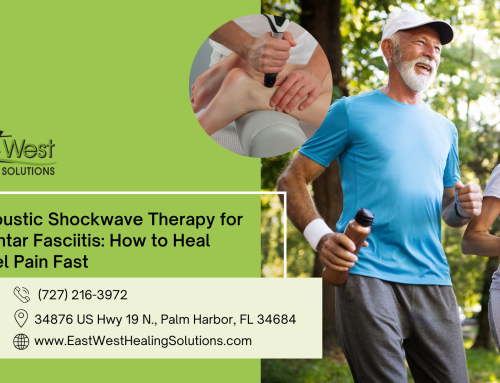Shoulder pain isn’t just inconvenient—it can change how you live your life.
It can make reaching into a cabinet feel impossible. Carrying groceries becomes a balancing act. Sleeping through the night without waking up in pain? Forget about it.
If you’ve been told your only options are pain medications, cortisone injections, or surgery, you might feel stuck between short-term relief and long-term risks.
But before you settle on a solution that may involve invasive procedures and months of recovery, there’s another path worth exploring: Acoustic Shockwave Therapy.
It’s a non-invasive, science-backed treatment that’s helping people with shoulder pain regain mobility, reduce inflammation, and avoid surgery altogether. Still, you might have questions—maybe even some hesitations. Let’s talk through the most common concerns, so you can make an informed decision.
“Does Shockwave Therapy actually work for shoulder pain?”
It’s normal to wonder if it’s “too good to be true.” You want proof that this isn’t just another temporary fix.
Here’s the science: Shockwave Therapy uses targeted sound waves to stimulate healing right where your body needs it. For shoulder pain, this can mean breaking down calcium deposits (in cases of calcific shoulder tendinitis), improving blood flow, and repairing damaged soft tissue—things that painkillers and rest alone simply can’t do.
What studies show: Research has found that many patients see significant improvement in pain and mobility within just a few sessions. Better yet, these improvements can last for months or even years when combined with proper rehab or strengthening exercises.
How it compares:
- Shockwave Therapy: Targets the root cause, non-invasive, short recovery.
- Surgery: Invasive, long recovery, potential complications.
- Medications: Temporary pain relief, no long-term healing benefits.
“Is it painful?”
We get it—the word “shockwave” can sound intense. But in reality, most patients find it much less intimidating than they expected.
You may feel mild discomfort during the session, similar to a deep tissue massage in a sore spot. This sensation usually lessens as the treatment continues, and we can adjust the intensity to your comfort level.
Many patients say it’s a small trade-off for the relief they experience afterward.
How it compares:
- Shockwave Therapy: Mild, short-lived discomfort.
- Cortisone Injections: Sharp needle pain, soreness after injection.
- Surgery: Significant post-op pain, weeks of recovery.
“Will I need to take time off work or my daily activities?”
One of the best things about Shockwave Therapy is the zero downtime. You can walk out of your session and go right back to your normal day.
You may be advised to avoid intense, high-impact activity for a short period, but you’ll still be able to do everyday tasks like driving, cooking, or going to work—without the weeks or months of restrictions that surgery would bring.
How it compares:
- Shockwave Therapy: No downtime, resume daily activities immediately.
- Surgery: Weeks to months of recovery, physical therapy required.
- Rest Alone: No real healing, risk of pain returning.
“Is it expensive?”
Cost is an important factor when deciding on any treatment. While insurance coverage for Shockwave Therapy can vary, the cost is often far less than surgery—and it may save you from months of physical therapy, medication expenses, or lost workdays.
Because it works by addressing the root cause, many patients require fewer treatments over time compared to ongoing therapies that only manage symptoms.
How it compares:
- Shockwave Therapy: Short treatment timeline, lower overall cost.
- Surgery: Higher upfront and hidden recovery costs.
- Ongoing Medications: Recurring expense, no permanent solution.
Why This Matters
Shoulder pain doesn’t just affect your comfort—it affects your independence, your work, and the activities you love. Choosing a treatment that works with your body to repair damage instead of just masking pain can make all the difference in your recovery and quality of life.
Your Next Step
If you’ve been living with shoulder pain and want a solution that’s non-invasive, highly effective, and designed to help you move freely again, Shockwave Therapy could be the answer.
Don’t wait until surgery becomes your only option. Take the first step toward relief today.
📞 Call us at (727) 216-3972 to book your consultation and find out if Shockwave Therapy is right for you.






